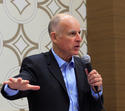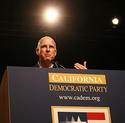Adding nearly 119,000 people in 2011, Florida has capped a decade of steady population increase to see the state grow 19% since 2000. Despite 2009, an historic year where more people left than arrived, the overall net growth of Florida has yielded two additional congressional seats, moving the state well on its way towards the becoming third most populous state in the nation. This ascendancy brings new responsibility to the shoulders of the state’s leaders, and the direction this st read more »
Policy
Urban Development: Playing Twister With The California Environmental Quality Act
When it comes to environmental issues, emotions often trump reasoned argument or sensible reform, especially in California. In Sacramento at our state capitol, real world impacts are abstracted into barbed soundbites. It’s the dialogue of the deaf as environmental advocates rally around our landmark California Environmental Quality Act (CEQA) -- and economic interests decry it as “a job killer.” Perhaps the polarization can be put aside to ask about a specific example in the real world. Why does an old K-Mart sit vacant on Ventura’s busiest boulevard despite initial City approval for a Walmart store? All the thunder and lightning surrounding whether a Walmart belongs in Ventura is behind us. A vigorous and contentious debate (and a failed citizen initiative) have rendered the verdict that filling an empty discount retail space with a different discount retailer is a function of the market, not government regulation. read more »
California's Deficit: The Jerry Brown and 'Think Long' Debate
California has three major problems: persistent high unemployment, persistent deficits, and persistently volatile state revenues. Unfortunately, the only one of these that gets any attention is the persistent deficit. It is even more unfortunate that many of the proposals to reduce the deficits are likely to make all three of the problems worse over the long run.
Two major proposals to deal with the deficit will shape the coming debate. One is from the newly formed Think Long for California Committee; the other from the governor. read more »
The U.S. Needs to Look Inward to Solve Its Economy
Over the past months as the global economy heads for another recession, U.S. lawmakers have done their best to deflect blame by focusing on various external forces including the most popular straw-man of the day: China’s currency.
Almost every year for the last few years, Congress and the White House have pressed China to revalue its currency, the renminbi. And every time this happens, China responds that it will do what it always does: let it appreciate gradually, at about 5% per year as it has done for the last several years. read more »
Central Florida: On the Cusp of Recovery?
Central Florida is poised at the cusp of a major turnaround, and its response to this condition will either propel the region forward, or drag it backward. This cusp condition is brought about by a train and a road; neither of which have begun yet but both of which appear imminent. Sunrail uses existing 19th century railroad tracks as a commuter spine through Orlando’s disperse, multipolar city. The Wekiva Parkway completes a beltway around Orlando, placing it with Washington DC, Houston and other ringed cities. Before either gets built, the region deserves some analysis read more »
Public Pensions: Reform, Repair, Reboot
Ill-informed chatter continues to dominate the airwaves when it comes to California public pensions. It’s a big, complex and critical issue for government at all levels in the Golden State. What makes debate so distorted is that public pensions actually differ from agency to agency — and advocates on the issue often talk past each other. Pension critics often point to outrageous abuses as if they were typical. On the other hand, pension defenders often cite current averages that understate long-term costs. All this fuels the typical partisan gridlock that Californians lament yet seem powerless to change in our state.
Credit Governor Jerry Brown for trying to overcome the polarization. read more »
Rethinking College Towns
As a practitioner in both consulting and local government, I have observed that in local communities nothing seems to prompt productive action better than a local crisis or strongly felt threat like a factory closure.
Unfortunately, we are often inclined to take action to close the barn door only after the horse has escaped. read more »
California: Codes, Corruption And Consensus
We Californians like collaboration. Before we do things here, we consult all of the “stakeholders.” We have hearings, studies, reviews, conferences, charrettes, neighborhood meetings, town halls, and who knows what else. Development in some California cities has become such a maze that some people make a fine living guiding developers through the process, helping them through the minefields and identifying the rings that need kissing.
Here’s an example. This is a (partial?) list of the groups who will have a say on any proposed project in my city, Ventura: read more »
- Login to post comments
Let’s Level the Inter-generational Playing Field
With President Obama’s speech in Osawatomie, Kansas decrying the growing economic inequality and lack of upward mobility in America, the issue has finally arrived at the center of this year’s campaign debates. read more »
- Login to post comments
Durban, Reducing Emissions and the Dimensions of Sustainability
The Durban climate change conference has come to an end, with the nations of the world approving the "Durban Platform," (Note 1) an agreement to agree later on binding greenhouse gas (GHG) reduction targets by 2020. read more »






















